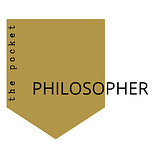Welcome back Philosophy People,
Today we’re going to wrap up our conversation on Immanuel Kant, but in true TPP form we’re going to use the tail end of our exploration of Kant to set us up and introduce tomorrow’s topic, which is epistemology according to the Buddha. And for good measure, we’ll throw in some ancient science from a guy named Copernicus too. We’re not entirely sure how we’re going to pull this off here on the TPP team, so you’ll definitely want to stick around and see how this goes.
Every morning I write an email exploring life through the eyes of the world’s greatest thinkers. Sign up here if you would like to receive it directly in your inbox.
Do you know someone who would love TPP, share it here!
Yesterday, we left Kant where he had split all of Western thought into two paths which would dominate the branches of philosophy to this day. It was kind of a big deal to pick a side so to speak in college—if you were Continental or Analytical. I wasn’t ready for the backlash that could come from picking the “wrong” side, so I largely avoided the topic to this day and just pretended I was better than everyone and walked a middle path…it didn’t really work, but I digress.
What’s most important about the neatly divided world that Kant created for us, will be his analysis of causation. Causation is a branch of what Kant refers to as categories. These categories are his way of establishing the root concepts, the things we know a priori. They are the ideas we use to form other ideas. And, these ideas are thoughts, not objects.
Think about it this way, if we are trying to understand the contents in a barrel that have been packed in an intentional order, the concepts are at the bottom of the barrel, the first things packed upon which everything else rests.
The concept that is most relevant for us is Causation. Causation is the understanding of an event through a linear succession of time.
This idea is almost identical to Theseus’s Ship—it’s a way to grapple with how identities of things stay constant even as they change over time (remember the Wandavision example a few days ago.)
The move that Kant makes which is significant for his time, is to make the assumption that our base concepts (the bottom of the barrel) get there through some chain of events. In this way, Kant is attempting to explain how a priori knowledge gets to us. He’s opening the door for instinct and innate knowledge to arrive to us in some other way than “the gods gave it to us.”
Ok, this is tough I know, but bear with me. Kant believes that something outside of us has to happen to us for us to know things instinctively. It appears he’s trying to philosophically wrestle with evolution a few hundred years before Darwin would posit his theory. That’s brave and for his time, a thought which would have found little acceptance.
In short, he argues that everything has a cause, and what lies beyond our ability to imagine is the ultimate source of causes, and he leaves room for this to be discovered in the future scientifically.
Ok, final layer down here, what this means for Kant is that actually most meaning we ascribe to events can’t truly be known because we don’t have access to the foundational causation of things. This means that both meaning and interpretation of reality which we ascribe to events does not happen in reality, but only inside our own brains (or at least, way beyond our brain’s ability to comprehend).
Essentially, Kant argues that we create for ourselves a window through which we ascribe meaning based on our a priori knowledge, but outside of our own interpretation, reality has little to no meaning or cohesive narrative. Here we can see the early roots of existentialism discussed last week by Simon De Beauvoir and others of her time.
This idea is often correlated with Copernicus, because he first observed that the sun does not revolve around earth, actually it is the other way around. For many historians, Kant did the same thing for epistemology, showing that reality and meaning cannot be found in the universe outside of our interpretations and imposed purpose. Therefore, meaning is not a universal, a priori concept, it is one we make up and layover events of life.
And this where we will both leave off and lead into tomorrow where we will explore the Buddha, thousands of years before Kant, similarly exploring the concepts of causality and what that has to say about reality and our perception of it.
Can’t wait to see you tomorrow, thank you for stopping by, share with a friend, and subscribe if you haven’t!
Keep thinking,
-TPP
The Great Conversation, Normal Melchert pp. 434-436
https://oregonstate.edu/instruct/phl201/modules/Philosophers/Kant/kant.html#:~:text=This%20ideas%20is%20called%20Kant's,on%20the%20mind%20(instead%20of
Image:
https://en.wikipedia.org/wiki/Nicolaus_Copernicus#/media/File:Nikolaus_Kopernikus_2.jpg















Share this post